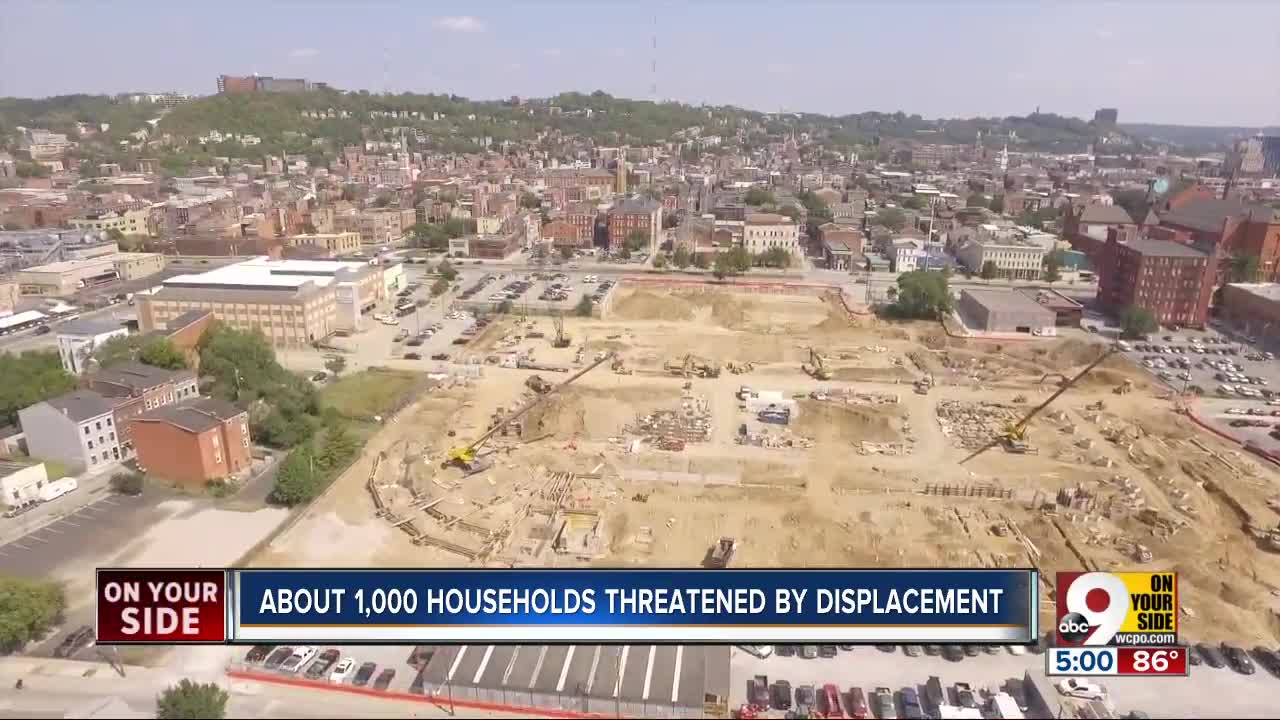CINCINNATI — Nearly 1,000 households in the West End are considered “extremely threatened” by the risk of displacement, according to the West End Housing Study released Thursday.
The households most at risk of displacement, 984 of them, account for 27% of all households in the West End, according to the report. The residents are renters with annual incomes of less than $31,350.
West End homeowners making more than $50,151 are not as likely to be threatened by displacement, the study says.
The study was led by The Port of Greater Cincinnati Authority and Seven Hills Neighborhood Houses with the financial support of FC Cincinnati.
Residents have long been concerned about the risk of losing their homes to the new FC Cincinnati stadium being built on the site of the former Stargel Stadium.
“This study highlights what we have believed: That the West End has experienced disinvestment for decades,” FC Cincinnati President and General Manager Jeff Berding said in a written statement. “FCC is proud to invest more than $250 million in private money in the neighborhood. The West End stadium will bring much-needed redevelopment and jobs.”
The study, conducted by outside consultant APD Urban Planning and Management, found “the gap in current housing stock affects people who fall within both ends of the income spectrum - those making $18,000 or less and $50,000 or more,” and that the goal of future development projects must “achieve price appropriate housing and zero displacements of residents.”
The study was required under the Community Benefits Agreement that includes FC Cincinnati, The Port and West End Community Council, according to a news release. FC Cincinnati provided $100,000 for the study and The Port paid for the remainder.
Community benefits agreements are contracts that require developers of large real estate projects to deliver economic concessions to community organizations in exchange for public support of their project.
FC Cincinnati’s deal calls for the team to spend $100,000 a year on youth soccer programs and offer jobs and contract opportunities to West End residents. FC Cincinnati also agreed to fund a housing study to “recommend specific measures to encourage investment” and “protect long-term, low-income residents from displacement.”
The team also agreed to contribute $100,000 toward “immediate housing needs” of West End residents. Finally, the agreement called for FC Cincinnati to hand over its purchase option for dozens of West End residential parcels to the Port, which agreed to establish a housing improvement fund “to assist with the creation of affordable housing units.”
Chevonne Childs can see FC Cincinnati’s stadium from her house. She works in the West End, and her daughter attends school in the neighborhood.
Childs, along with some other residents, are worried about the future of the West End.
“It’s a lot of generations of families that grew up here, and they don’t just want to leave the only neighborhood they know,” Childs said.
Laura Brunner, president and chief executive officer of The Port, said the organization’s goal is that “everyone gets to stay.” The West End Housing Study identifies a need for market-rate housing in the neighborhood, Brunner said.
“There’s room for more apartments and single family homes for people on a higher income level as well as the need for protection for lower income people,” Brunner said.
Asked what happens if property values increase because of the stadium, Brunner said some people will be protected.
“There are certain people who are living in public housing, so they’re protected and that’s the highest percentage of the people that are living in affordable housing,” Brunner said.
Brunner said The Port, FC Cincinnati, Seven Hills Neighborhood Houses and other organizations will come together to make it possible for people who are living in the West End to stay.
She said nonprofits and private developers will build new affordable housing projects in the West End.
Recommendations from the West End Housing Study include protecting low-income residents from displacement, stabilizing the community through preservation of existing housing stock and encouraging strategies for job creation and business retention.
According to the study, 74% of residents “are currently at some risk of displacement,” and a “significant number of blighted buildings are vacant.”
There are limited housing options for families with incomes under $18,000, the study said, and more than 40% of West End renters spend more than 30% of their monthly income for housing expenses.
Of the residents surveyed in the study, 80% have a desire to stay in the West End. The average respondent was a legacy homeowner, someone who has been living in the West End for more than 21 years.
View the full study here:



